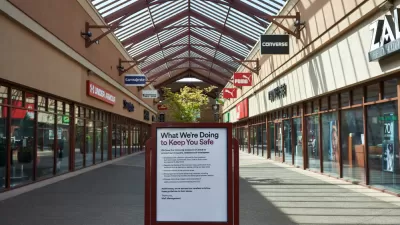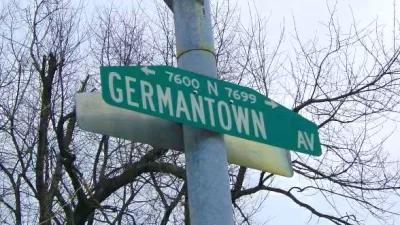Beginning with the first U.S. planned urban development, St. Augustine, Fla., and ending with one of Portland's newest neighborhoods, the Pearl District, host Geoffrey Baer takes us through ten developments that left their mark, for better or worse.

"10 Towns that Changed America focuses on ten 'experimental' towns that did not evolve organically over time, but instead were designed (or redesigned) from the ground up by visionary architects, corporations, and citizens, who sought to change the lives of residents using architecture, design, and urban planning," states the introduction to the PBS special produced by WTTW, Chicago's NPR affiliate.
However, "visionary" does not always produce good results, as some examples show. While (#7) Levittown in Long Island (as well as those in Pennsylvania, New Jersey and Puerto Rico) might have been a boon for new residents fleeing cities, African Americans were excluded, and their legacy in urban planning includes "build(ing) the foundation of suburban sprawl that we have today," writes Erin Chantry in "The Legacy of Levittown."
A better example among the ten examples of well-intentioned urban planning gone awry is (#8) Southwest Washington, DC.
The Southwest DC development approach defined a new concept in planning: "urban renewal." Urban renewal started with a bulldozer and continued with the construction of Modernist towers and "superblocks" dedicated solely to housing, versus the mixed uses of the old neighborhood.
The ten towns, which can be cities, suburbs, or districts, are presented in this order, with links to the description and video provided by WTTW beginning with Philadelphia (PBS takes care of St. Augustine, as well as providing links for a 30-second preview and the 56-minute program).
- St. Augustine, FL WATCH CLIP
- Philadelphia, PA
- Salt Lake City, UT
- Riverside, IL
- Pullman – Chicago, IL
- Greenbelt, MD
- Levittown, NY
- Southwest Washington, D.C.
- Seaside, FL
- Pearl District – Portland, OR
Produced by WTTW, Chicago, the website for "10 Towns that Changed America," that also includes 10 additional towns not shown in the PBS program on April 19.
FULL STORY: 10 Towns that Changed America

Maui's Vacation Rental Debate Turns Ugly
Verbal attacks, misinformation campaigns and fistfights plague a high-stakes debate to convert thousands of vacation rentals into long-term housing.

Planetizen Federal Action Tracker
A weekly monitor of how Trump’s orders and actions are impacting planners and planning in America.

In Urban Planning, AI Prompting Could be the New Design Thinking
Creativity has long been key to great urban design. What if we see AI as our new creative partner?

King County Supportive Housing Program Offers Hope for Unhoused Residents
The county is taking a ‘Housing First’ approach that prioritizes getting people into housing, then offering wraparound supportive services.

Researchers Use AI to Get Clearer Picture of US Housing
Analysts are using artificial intelligence to supercharge their research by allowing them to comb through data faster. Though these AI tools can be error prone, they save time and housing researchers are optimistic about the future.

Making Shared Micromobility More Inclusive
Cities and shared mobility system operators can do more to include people with disabilities in planning and operations, per a new report.
Urban Design for Planners 1: Software Tools
This six-course series explores essential urban design concepts using open source software and equips planners with the tools they need to participate fully in the urban design process.
Planning for Universal Design
Learn the tools for implementing Universal Design in planning regulations.
planning NEXT
Appalachian Highlands Housing Partners
Mpact (founded as Rail~Volution)
City of Camden Redevelopment Agency
City of Astoria
City of Portland
City of Laramie





























